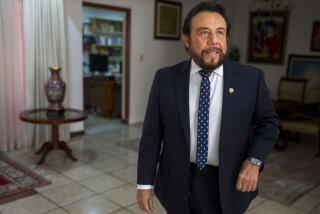Aide Disagrees With Marcos, Sees Long War
- Share via
MANILA — Philippine Defense Minister Juan Ponce Enrile said Monday that the Communist-led insurgency here cannot not be contained for at least a decade, an estimate at sharp odds with that of President Ferdinand E. Marcos.
The president recently claimed that “we’ll wipe them out” in one year with continued U.S. military aid.
“I am not that optimistic,” Enrile told a press forum here. “I think we are getting too panicky about it. In the case of Malaysia, it took three or four decades” to put down a Communist insurgency.
Also on Monday, Marcos--declaring “there is not a moment to lose”--submitted a deferred resignation along with his party’s bill calling for early presidential elections to seek a new mandate in the troubled Philippines. His resignation from the remaining portion of his term will not take effect until a winner is declared in the Jan. 17 polling.
Although expressing pessimism regarding the rebels, Enrile insisted that the government’s anti-insurgency program is on the right track. Any succeeding president “will have to use the same formulation adopted by President Marcos,” he said.
American officials have been more pessimistic than either Enrile or Marcos. Military, political and economic reforms urged by Washington would have to be stepped up, Assistant Secretary of Defense Richard L. Armitage has warned. The present pace is “insufficient to arrest the growth of the insurgency,” he said.
Paul D. Wolfowitz, assistant secretary of state for East Asian and Pacific affairs, recently told a congressional committee that the Philippines is moving toward “civil war on a massive scale.”
During the last week, the insurgency has been overshadowed in the political arena here by Marcos’ call for early presidential elections in January, but it will be a top issue in any campaign.
‘Dangerous Statement’
Jaime Ferrer, an opposition member of Parliament, combined the questions by saying Marcos made a “dangerous statement” last week in ordering the armed forces confined to their barracks on the proposed Jan. 17 election day and the five days before.
Ferrer said the order invited disruption of the polls by guerrillas of the Communist New People’s Army. He then charged that any guerrilla interference would work to Marcos’ advantage because the rebels want to retain Marcos in power as a political target.
Gen. Fidel V. Ramos, the acting armed forces chief, responded that the army “will be ready to meet any NPA challenge.” President Marcos’ order said barracks confinement would be lifted in case of emergency, and Ramos said it will be up to local commanders to determine if an emergency is at hand.
“We shall be in proper uniform and around for action,” he told the forum.
Enrile said the “name of the game is a struggle” between the Communist-proposed system and a democratic system.
Won’t Raise White Flag
“Their target is freedom,” he said. “We are not ready to raise the white flag to them. In my opinion, that will never happen.”
Augusto Sanchez, another opposition legislator, assailed what he called the government’s penchant for a military solution. “You can’t fight ideology with bullets,” he said. “The problem is a lack of freedom and justice.”
Ramos contended that the armed forces have adopted a new approach, working at the local level with civilian agencies in so-called peace and order councils. He said councils have been formed in 75% of the country’s cities and villages.
However, the development has come late in the game, Ferrer insisted.
“When you started it (the campaign against the New People’s Army), you were not involving people,” he said. “You did not even consult the mayors. As a result, you failed. Now you want the help of the people.”
The resignation document filed by Marcos read in part: “It has been the practice and tradition in all democracies that the president continues in office until the president-elect shall have qualified and assumed office. . . . Any alternative will cause an undesirable and dangerous hiatus in the government.”
A victory or loss by Marcos in the proposed snap election would make his resignation moot, but it seeks to satisfy a constitutional requirement.
Filed With Parliament
The election bill and the resignation were filed with the Parliament. The legislators, meeting in the blond-paneled, blue-carpeted chamber, referred the bill to the Revision of Laws Committee, which is expected to discuss it on Wednesday.
Meanwhile, the ruling New Society Movement (KBL) and the opposition will meet behind closed doors to discuss proposed changes, including a possible delay in the balloting.
The KBL majority could have its way on the election plan, barring constitutional challenge. Its ranks are firm but not solid. For instance, KBL stalwart Arturo Tolentino, a former foreign minister, told a press forum Monday morning: “Twenty years (of Marcos rule) has been too long. The president might be tired already.”
Tolentino quickly added that he was thinking about a KBL successor as president, not an opposition figure.
More to Read
Sign up for Essential California
The most important California stories and recommendations in your inbox every morning.
You may occasionally receive promotional content from the Los Angeles Times.













